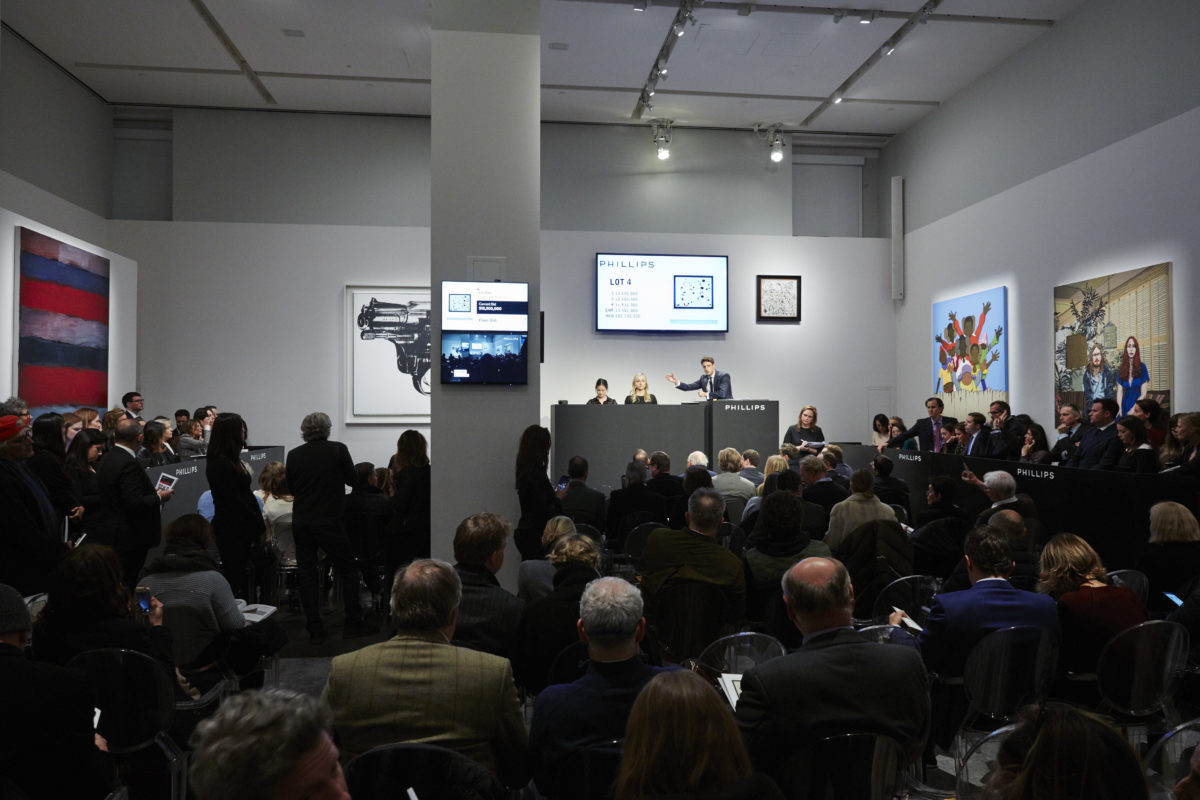
Phillips had a tough time at its 20th century and contemporary art sale tonight. Ten lots went unsold (seven were bought in and three withdrawn), including a heavily promoted wood combustion painting by Alberto Burri (est. $10 million—15 million); a “Gray Painting” by the historically reliable market star Christopher Wool (est. $4 million—6 million); and the catalogue’s cover lot, a Jackson Pollock painting once owned by Nelson Rockefeller (est. in the region of $18 million),
The house had hoped to build on the momentum from its $135 million contemporary sale in London this past March, which was its most successful to date. But in New York it brought in just $88.5 million, well short of the $100 million-plus it expected. Even though 78 percent of the lots were fresh to the market, the event sold just 82 percent by lot and 71 percent by value.
Alberto Burri, Grande Legno e Rosso (1957-59). Photo courtesy of Phillips.
Phillips has made a concerted effort to expand its modern art portfolio under the leadership of Hughes Joffre, special advisor to the CE), and 12 percent of the evening sale’s lots were modern works. (Unlike its competitors, Phillips combines 20th century and contemporary art into one sale.)
The category got off to a great start when drawn out bidding pushed the evening’s top lot, Joan Míro’s Femme dans la nuit (1945) (est. at $12 million—18 million), to $22.6 million.
But other works from the period faltered, including some of the most high-profile lots—most notably Burri’s Grande legno e rosso (1957-59), which had been touted to set a new auction record for the artist, and Pollock’s Number 16 (1950), a small-scale drip painting that Nelson Rockefeller donated to Rio de Janeiro’s Museum of Modern Art. Works by David Hockney, Donald Judd, Dan Flavin, and Kerry James Marshall also failed to sell.
Jackson Pollock, Number 16 (1950). Image Courtesy Phillips
Sales of modern art were lackluster at Christie’s and Sotheby’s as well, with Christie’s notching a sell-through rate of 85 percent (and a sales total of $279.3 million) and Sotheby’s selling through 77 percent ($315 million total).
After the auction, Phillips CEO Ed Dolman attributed the house’s disappointing performance to a saturated market. “I think the market is fine, but I think it’s a discerning and selective marketplace,” he said. “There’s been billions of dollars worth of art on sale this week in New York and buyers have had a huge choice of things to buy.”
Joan Miro, Femme dans la nuit (1945). Photo courtesy of Phillips.
There were some positives, however. Henri Laurens’s La Lune (1946) set a new record for the artist when it sold for $2.1 million. Amy Sillman’s U (2008) also sold for a record price of $855,000, while Carmen Herrera more than doubled her previous record of $1.1 million with the sale of her Blanco y Verde (1966) for $2.6 million. Meanwhile, market darling KAWS continued his streak with the record-setting sale of his painting Untitled (Fatal Group) (2004) for $2.7 million; his monumental sculpture CLEAN SLATE (2014) went for $1.9 million.
“We’re obviously very pleased with KAWS and Miro,” Dolman said. “Those prices are extraordinary, and the KAWS phenomenon goes on.”
Carmen Herrera, Blanco y Verde (1966). Photo courtesy of Phillips.
Coinciding with his retrospective at the Whitney Museum, Andy Warhol’s Gun (1981-1982), described by Phillips ahead of the sale as “the most significant work by Warhol in the market this season (and rumored to belong to former Sotheby’s auctioneer Tobias Meyer), found a new home when it changed hands for $9.5 million, making it the second-most expensive work of the night. “It’s nice to see such a solid price for the Warhol gun because the Warhol market has been a little unpredictable,” Dolman told artnet News.
And that was about it for the positive spin on the night.